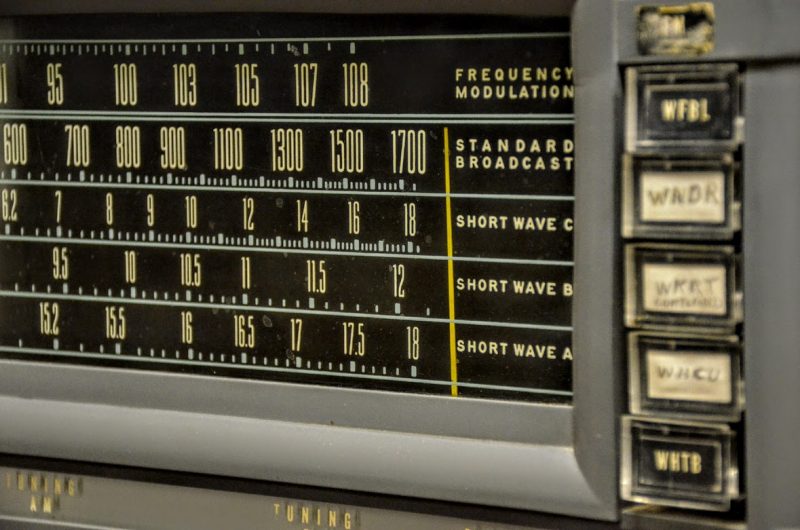 Radio Waves: Stories Making Waves in the World of Radio
Radio Waves: Stories Making Waves in the World of Radio
Because I keep my ear to the waves, as well as receive many tips from others who do the same, I find myself privy to radio-related stories that might interest SWLing Post readers. To that end: Welcome to the SWLing Post’s Radio Waves, a collection of links to interesting stories making waves in the world of radio. Enjoy!
Many thanks to SWLing Post contributors Richard, Michael Bird, for the following tips:
Far East Broadcasting Celebrates 75 Years (Missions Box)
LA MIRADA, CA – Two students attending Southern California Bible College were given the vision to establish the Far East Broadcasting Company, which they incorporated in 1945.
Their initial broadcasting location was in Shanghai in the midst of the Chinese people whom the Lord had laid upon their hearts. The effort was short-lived, however, when China closed its doors to all missionary work in 1948.
Some people would have considered that to be the death of the vision. Not Bob Bowman, John Broger, or their supportive pastor, William Roberts. The vision remained the same, FEBC would have to find a different location.
On June 4, 1948, FEBC regenerated from station KZAS in Manila. By 1949, FEBC was equipped to air broadcasts from the Philippines, across the South China Sea, and into parts of China.
Now celebrating its 72nd year of continuous operations, Far East Broadcasting Company has expanded multiplied times and broadened its ministry to include AM, FM, shortwave, satellite, internet, and other digital technologies.[…]
Theaters Return To An Old Art Form — The Radio Drama — With A Twist (NPR)
As theaters across the world have closed because of the coronavirus pandemic, they’ve scrambled to find ways get work to the public.
Some have made archival video of productions available, some have created Zoom plays and some have returned to an old art form — radio drama — but with a digital twist.
In the 1930s, with many people out of work, families huddled around radio receivers to listen to audio plays, like Orson Welles’ famous broadcast, War of the Worlds.
“Orson Welles began his career as a theater actor and director,” says Adam Greenfield, artistic director for New York’s Playwrights Horizons. “And I think he’s able to really utilize the full potential of what audio can do.”
Taking cues from Welles’ success, Greenfield commissioned a new series of audio plays for podcast called Soundstage. He planned to release them this summer, when the theater was dark, but because of the pandemic he hustled them online.
The first podcast released was Prime: A Practical Breviary by songwriter and performer Heather Christian. It’s based on the 6:00 a.m. rite, or breviary, of solo contemplation for nuns and monks.[…]
Do you know Rufus Turner (Hackaday)
It is hard to be remembered in the electronics business. Edison gets a lot of credit, as does Westinghouse and Tesla. In the radio era, many people know Marconi and de Forest (although fewer remember them every year), but less know about Armstrong or Maxwell. In the solid-state age, we tend to remember people like Shockley (even though there were others) and maybe Esaki.
If you knew most or all of those names without looking them up, you are up on your electronics history. But do you know the name Rufus Turner?
W3LF
Turner was born on Christmas Day, 1907 in Houston, Texas. At the age of 15, he became fascinated by crystal diodes and published his first article about radio when he was 17. Rufus Turner was–among other things–the first black licensed radio operator (W3LF). He was building and operating radios in Washington D.C., where he was attending Armstrong Tech.
Turner became a licensed professional engineer in California and Massachusetts. You may have even used something that Turner worked on. In the 1940’s, working with Sylvania, he helped to develop the 1N34A germanium diode (you can still buy these if you look around for them).[…]
Register now for Free Foundation Online Training course (Southgate ARC)
The next free amateur radio Foundation Online training course run by volunteers from Essex Ham starts on Sunday, June 21
The Coronavirus outbreak and the RSGB’s introduction of online exams that can be taken at home has led to a surge in demand for free online amateur radio training courses such as that run by Essex Ham.
To cope with the high-demand from people wanting to get their amateur radio licence, the Essex Ham Team have been running an additional online training course each month. The next course starts on June 21.
You can find out more about online training and register to join a course at
https://www.essexham.co.uk/train/foundation-online/Essex Ham
https://www.essexham.co.uk/
https://twitter.com/EssexHam
Do you enjoy the SWLing Post?
Please consider supporting us via Patreon or our Coffee Fund!
Your support makes articles like this one possible. Thank you!


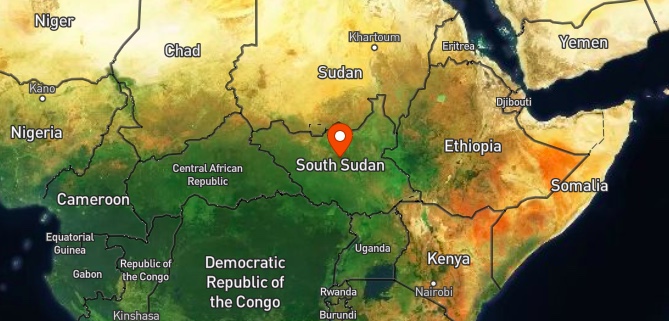
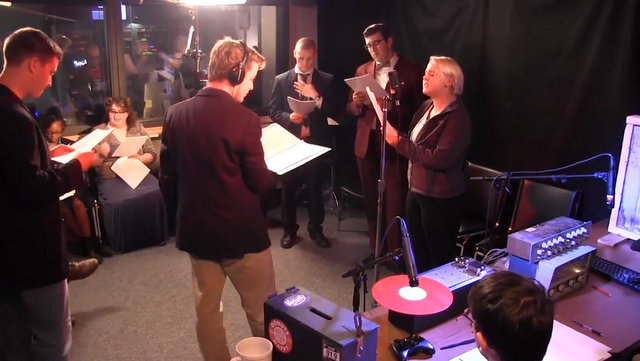
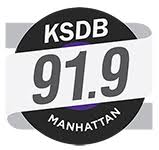 A few months ago, I was inspired to start writing a radio drama about a number station after reading an article on the SWLing Post about someone working at a number station.
A few months ago, I was inspired to start writing a radio drama about a number station after reading an article on the SWLing Post about someone working at a number station.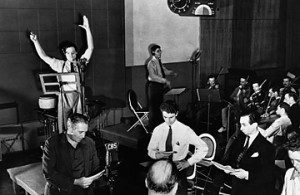 Without a doubt, one of the most famous broadcasts in radio history––indeed, in American history––was Orson Welles’ radio production of the H. G. Wells’ classic sci-fi novel, The War of the Worlds. A Halloween radio drama from the The Mercury Theatre on the Air series from the Columbia Broadcasting System (CBS), The War of the Worlds aired on October 30, 1938–exactly 75 years ago, today. And it’s still creating a stir…
Without a doubt, one of the most famous broadcasts in radio history––indeed, in American history––was Orson Welles’ radio production of the H. G. Wells’ classic sci-fi novel, The War of the Worlds. A Halloween radio drama from the The Mercury Theatre on the Air series from the Columbia Broadcasting System (CBS), The War of the Worlds aired on October 30, 1938–exactly 75 years ago, today. And it’s still creating a stir…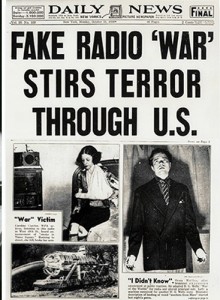
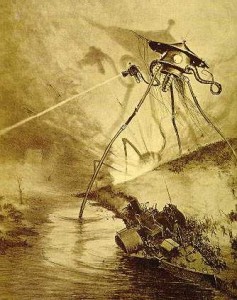
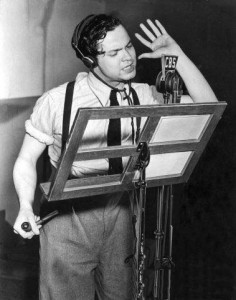
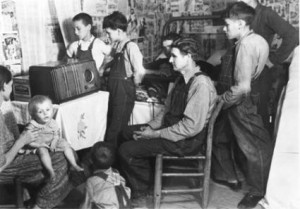 Regardless: whether Welles created widespread or merely local panic, or whether you even buy my theory that this production taught us to question what we hear, it’s difficult to deny that the Orson Welles’ production of The War of The Worlds was a brilliant, ground-breaking radio drama. And, I would add, great seasonal entertainment. Fortunately for us, almost 75 years later (nearly to the minute!), we can listen to archived recordings of the original CBS production.
Regardless: whether Welles created widespread or merely local panic, or whether you even buy my theory that this production taught us to question what we hear, it’s difficult to deny that the Orson Welles’ production of The War of The Worlds was a brilliant, ground-breaking radio drama. And, I would add, great seasonal entertainment. Fortunately for us, almost 75 years later (nearly to the minute!), we can listen to archived recordings of the original CBS production.